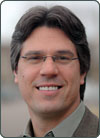 |
 |
 |
 |
 |
|
On Demand Video
A More Perfect Person: Legal and Ethical Issues Related to Cyborgs, Genes and Human EnhancementUse calculator to show CLE credit for your state.
This course examines current legal and ethical debates surrounding human enhancement technologies. A panel of experts will discuss how emerging technologies such as interactive prosthetics and cyborg advances have changed the person-property continuum. This program will cover a myriad of legal and ethical questions arising from the human genome project, stem cell research, organ printing and nano-technologies. Participants will learn the sides of the current legal debate over a variety of fascinating issues, including: At what point does a human being become a machine? Can human gene sequences be patented and sold by companies? Can insurance companies discriminate based on genetic test results? In this course, lawyers will:
|
PRICE: $129.00
|
|||||||||
|
 Jeffrey StecJeffrey Stec, J.D. has been a licensed lawyer since 1992, having practiced in the area of complex-family matters, including estate, divorce, and child custody disputes. Jeff developed his collaborative skills by becoming a certified mediator and strategic planning facilitator, specializing in family issues. Jeff has developed an expertise in the collaborative resolution of disputes, and in addition to his work with The Likeable Lawyer, he is currently a sought-after consultant who works with non-profits and municipalities to fashion solutions to complex organizational and community issues. Jeffrey graduated with honors from the University of Michigan Law School, and earned a Bachelor of Arts in English with high honors from the University of Michigan.  Sander RabinA former ophthalmic surgeon and biomedical patent attorney, Sander Rabin, MD, JD speaks, writes, and consults on the ethical, legal, and policy implications of human enhancement, artificial intelligence and transhumanism. He is the executive director of The Center for Transhuman Jurisprudence, Inc. a not-for-profit organization he founded, whose mission is to educate and empower people in making the choices that are and will be available to them in enhancing their minds, bodies, genomes, longevity, and progeny.  Linda GlennLinda MacDonald Glenn is an attorney, bioethics professor, and futurist. Her research encompasses the legal, ethical, and social impact of exponential technologies and "evolving notions of personhood." She holds appointments at the Alden March Bioethics Institute at Albany Medical Center and California State University Monterey Bay. Linda is a Fellow at the Institute for Emerging Technologies, a Fellow of the American Bar Foundation, and she has lectured at Singularity University. Linda pioneered in the area of bioethics law, with the U.S. Supreme Court, in Cruzan vs. Director, Missouri Dept. of Health, citing one of her cases. She has advised governmental leaders and agencies and published numerous articles including Ethical Issues in Transgenics and Genetic Engineering at Actionbioscience.org, Human-Machine Mergers (or the Cyborgs Cometh), Issues in Regenerative Nanomedicine and The Moveable Feast: Legal, Ethical and Social Implications of Converging Technologies On Our Dinner Tables. She has made numerous media appearances, including the History Channel, Science Channel, and NPR. Links to the downloadable or streaming materials you've purchased will be available with your receipt and in your profile. Credit ReportingOur courses are approved in almost all states that have CLE requirements. Accreditation for a particular course will vary by state. Please use our CLE calculator for CLE credit available in your state. For more information, visit our FAQ. |
||||||||||

Attorney
Attorney
FedEx Corp. Legal Dept.
Davis & Young
Attorney